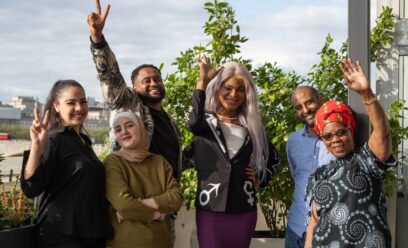Creating an impact with our communications in 2021
Posted by Katherine Maxwell-Rose on January 14, 2021As the nation happily waved goodbye to the difficult and trying year that was 2020, the new year kicked off with an equally painful bang. Rising Covid cases, a further lockdown and the violence seen in Washington last week have caused many to predict a grim year ahead.
For people working and hoping for a fairer immigration system, the challenges are certainly evident. Many vulnerable people particularly those seeking asylum or without recourse to public funds were already struggling to survive in the first waves of the pandemic. For those arriving on the shores of the UK to find safety and sanctuary after tumultuous journeys, the rhetoric from the government has been particularly unwelcoming and the living conditions most face are deeply problematic.
In spite of all these uncertainties and difficulties, we at IMIX like many other charities believe that there will be ways in which we can make a difference and an impact in 2021. Here are a few approaches to communications that we believe will be help to create a better narrative about immigration in the UK this year.
Celebrate the good
Throughout the pandemic, we have seen people all over the country stepping up to support their communities in the most extraordinary ways. From Zak who is seeking asylum and volunteering at his local food bank to the Syrian women cooking hundreds of meals for the NHS to the grassroots refugee charity in Wolverhampton ensuring families have laptops and internet access, story after story has emerged of people sharing kindness, hospitality and support with their neighbourhoods. With further lockdowns and restrictions set to continue, look out for these uplifting community stories, which are often found in the local news. When they appear in the media, we can elevate them to our own networks and acknowledge the good work being done.
Share stories which encourage empathy
The realities facing many who migrate to the UK are challenging; not only do they have to build a new life in a new country often having to master the language quickly but the environment is still hostile. All of us will have seen stories presented in the media which seem intent on whipping up further hatred and xenophobia. Sharing human stories which encourage understanding and empathy is one way to counter this negative narrative. The kinds of stories which demonstrate the pain of a mother separated from her children, young people in hope of a better future or children in need of a safe place to live – all tap into the public’s intrinsic value system which can transcend politics. These stories don’t just have to be harrowing, they can also be uplifting and inspiring. At best they will encourage community cohesion, acceptance, hospitality and generosity towards those making their home in the UK.
Respect for key workers
One of the media highlights from last year was how the role of key workers was celebrated, from care workers to nurses to supermarket van drivers, those who are often overlooked received much more profile. What became overwhelmingly clear was that so many of these crucial frontline workers come from migrant and refugee backgrounds. According to a Nuffield Trust analysis in 2019, almost one in four people who work in hospitals were not born in the UK and one in five of all healthcare and social care workers.
This brilliant and detailed piece in Al-Jazeera took an in-depth look at how the Afghan fruit sellers of Birmingham are now on the frontline of food supply in the city while also describing their journey as asylum seekers. Last year, Hassan Akkad shared the realities of being a hospital cleaner on a Covid ward while Dr Ahmad Alomar demonstrated how he was using vital skills learnt during the Syrian civil war to respond on the frontline of the pandemic. These stories were often able to draw attention to the issues people from migrant backgrounds face such as poverty and visa difficulties, and in relation to the NHS health surcharge – even, create policy change.
Throughout this year, as the pandemic continues to play out, we will see an ongoing focus on the crucial role of key workers. It is worth paying attention to where public opinion could push for political change when those serving our communities during this crisis are coming up against a restrictive immigration system.
Look for windows of opportunity
These opportunities may seem few and far between but considering where there could be political movement on an issue and also discovering where unusual allies may be found is worthwhile. A news story in the Northern Echo last week highlighted a young doctor from Syria, Dr Bashar Al Hana, who was due to be deported before his local Darlington MP, Peter Gibson, helped him plead his cause to the Home Office. Despite being a Conservative MP and believing in tight immigration controls, the MP was obviously moved by Dr Al Hana’s story and saw his potential particularly in light of the current needs of the NHS. It’s interesting in this case to see the impact of an individual’s story on a politician and how it was a local refugee charity who first introduced them. Former Home Office Minister, Caroline Nokes has also given a recent interview which is deeply critical of the government’s current ‘inhumane’ approach to immigration. These kind of allies are particularly useful when it comes to campaigning for policy change. It is always worth building relationships with political influencers, in spite of what differences may exist, to see what positive synergy can be found. Drawing attention to those sympathetic to certain issues also ensures that our communications approach does not become overly-critical of politicians and allows the audience to see where change could happen.
There will certainly be many challenges in 2021 but through powerful storytelling, celebrating the good work being done and looking for where there could be opportunities for political movement, we can continue to create communications which make an impact. We’d also love to hear from you if you have stories and campaigns that need to be shared and elevated to see where we can bring further amplification to them. Together, we can get through this time and create the change that is so desperately needed.




